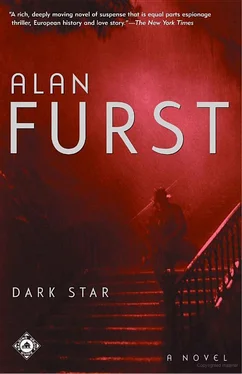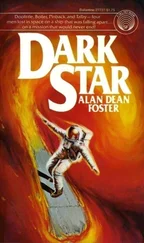Alan Furst - Dark Star
Здесь есть возможность читать онлайн «Alan Furst - Dark Star» весь текст электронной книги совершенно бесплатно (целиком полную версию без сокращений). В некоторых случаях можно слушать аудио, скачать через торрент в формате fb2 и присутствует краткое содержание. Жанр: Шпионский детектив, на английском языке. Описание произведения, (предисловие) а так же отзывы посетителей доступны на портале библиотеки ЛибКат.
- Название:Dark Star
- Автор:
- Жанр:
- Год:неизвестен
- ISBN:нет данных
- Рейтинг книги:3 / 5. Голосов: 1
-
Избранное:Добавить в избранное
- Отзывы:
-
Ваша оценка:
- 60
- 1
- 2
- 3
- 4
- 5
Dark Star: краткое содержание, описание и аннотация
Предлагаем к чтению аннотацию, описание, краткое содержание или предисловие (зависит от того, что написал сам автор книги «Dark Star»). Если вы не нашли необходимую информацию о книге — напишите в комментариях, мы постараемся отыскать её.
Dark Star — читать онлайн бесплатно полную книгу (весь текст) целиком
Ниже представлен текст книги, разбитый по страницам. Система сохранения места последней прочитанной страницы, позволяет с удобством читать онлайн бесплатно книгу «Dark Star», без необходимости каждый раз заново искать на чём Вы остановились. Поставьте закладку, и сможете в любой момент перейти на страницу, на которой закончили чтение.
Интервал:
Закладка:
“My work is difficult, comrade General, but less difficult than that of many others, and I am content to be what I am.”
Bloch absorbed his answer and nodded to himself. “So you march along,” he said. “There are some,” he continued pensively, “who find themselves deeply disturbed by the arrests, the trials. We cannot deny it.”
Oh cannot we? “We’ve always had enemies, within and without. I served in the civil war, from 1918 to 1920, and fought against the Poles. It isn’t for me to judge the operations of state security forces.”
Bloch sat back in his seat. “Very well put,” he said after a time. Then his voice softened, just barely audible above the steady rumble of the train. “And should it come your turn? Then what?”
Szara could not quite see Bloch’s face in the shadow of the seat across from him, the countryside was dark, the light from the corridor dim. “Then that is how it will be,” Szara said.
“You are a fatalist.”
“What else?” They lingered there a moment too long for Szara. “I have no family,” he added.
Bloch seemed to nod at that, a gesture of agreement with a point made or a confirmation of something he believed. “Not married,” he mused. “I would have guessed otherwise.”
“I am a widower, comrade General. My wife died in the civil war. She was a nurse, in Berdichev.”
“So you are alone,” Bloch said. “Some men, in such circumstances, might be careless of their lives, since nothing holds them to the world. Unconcerned with consequence, such men rise to an opportunity, sacrifice themselves, perhaps to cure their nation of a great evil. And then we have-why not say it? A hero! Do I have it right? Is this your view?”
A man and a woman-she had just said something that made him laugh-went by in the corridor. Szara waited until they passed. “I am like everybody else,” he said.
“No,” Bloch said. “You are not.” He leaned forward, his face taut, concentrated. “To be a writer, that requires work. Work and sacrifice. And the determination to follow a certain road, wherever it may lead. Remember that, comrade journalist, whatever might happen in the days ahead.”
Szara started to reply, to fend off a version of himself he found grandiose, but Bloch raised a hand for silence. The gesture was casual enough, but it struck Szara dumb. The general stood and unlatched the door, stared at Szara a moment, a look that openly weighed and calculated, then left the compartment abruptly, closing the door firmly behind him and disappearing down the passageway.
Some time later, the train halted at Ulm. The station platform was a lacework of shadows, and raindrops refracted trails of light as they rolled down the compartment window. A figure with a hat and an underarm briefcase hurried across the platform and entered the passenger door of a black Grosser Mercedes-an automobile often used by Reich officials-which sped away from the railroad station and was soon lost in the darkness.
A hero?
No, Szara thought. He knew better. He’d learned that lesson in war.
At the age of twenty-three, in 1920, he had campaigned with Marshal Tukachevsky, writing dispatches and inspirational stories for the home front, much as the writer Babel-a Jew who rode with Cossack cavalry-had served General Budenny. In the midst of the war against Poland, the Soviet forces had been driven back from Warsaw, from the banks of the Vistula, by an army commanded by General Pilsudski and his adviser, the French general Weygand. Szara’s squadron, during the retreat, had been set upon by Ukrainian bandits, a remnant of the Petlyura army that had occupied Kiev. Attacked from the ridge of a hillside, and outnumbered, they had fought like men possessed, all of them-cooks, clerks, wagon-masters, and military correspondents. For the previous day they’d come upon the body of a Polish colonel, stripped bare, tied by one foot to a high tree branch, the impaling stake protruding from between his legs. The Ukrainian bands fought both sides, Poles and Russians, and God help anyone they took alive.
From horseback, Szara had ridden down one man, slashed at another with his saber. In the next instant he and his horse were down in the dust, the horse whinnying in pain and terror, its legs thrashing. Szara rolled frantically away from the animal, then a smiling man walked toward him, a small dagger in his hand. Horses galloped past them, there were shots and screams and pointless shouted commands, but this man, in cap and overcoat, never stopped smiling. Szara crawled on all fours, a horse leapt over him and its rider cursed, but he could gain no ground. The battle that raged around them mattered not to Szara nor, apparently, to his good-humored pursuer. The smile was meant, he understood, to be reassuring, as though he were a pig in a sty. As the man closed on him he made a cooing sound and Szara came suddenly to his senses, fumbled his revolver loose of its holster, and fired wildly. Nothing happened. The smile broadened. Then Szara took hold of his fear, as though he could squeeze it in his fist, aimed like a marksman on a target range, and shot the man in the eye.
What he remembered later was not that he had fought bravely, he had simply decided that life mattered more than anything else in the world and had contrived to cling to it. In those years he had seen heroes, and how they went about their work, how they did what had to be done, and he knew he was not one of them.
The train was late getting into Prague. A Jewish family had attempted to board at Nurnberg, the last stop on German soil. Jews had been strongly “encouraged” to emigrate from Germany-not least by a hundred and thirty-five racial decrees, together entitled “The Law for the Protection of German Blood and German Honor”-to whatever country would accept them. But the situation, Szara knew, was not unlike that under the czar: a bureaucratic spider web. While you could get Paper A stamped at the local police station, the stamp on Paper B, received from the Economic Ministry, was now out of date and would have to be applied for all over again. Meanwhile, Paper A ran its term and automatically revoked itself.
The Jewish family at Nurnberg simply attempted to board the train, a pointless act of desperation. Thus young children, grandparents, mother and father, scampered in terror all around the station while policemen in leather coats chased them down, shouting and blowing whistles. Meanwhile, the passengers peered curiously from the train windows. Some, excited by the chase, tried to help, calling out, “There, under the baggage cart!” or “She’s crossed the tracks!”
Just after midnight it was cold in Prague, there were frost flowers on the paving stones, but the hotel was not far from the station, and Szara was soon settled in his room. He stayed up for hours, smoking, writing notes on the margin of Le Temps, studying the baggage ticket he’d been given. He was being drawn into something he did not understand, but he had a strong intuition about what awaited him at the end of it.
This extramarital affair with the services had been simple in the beginning, five or six years earlier, for they’d used him as an intellectual, an agent of influence, and he’d liked it, found it flattering to be trusted. Now he had gotten in over his head, and he had no doubt it would kill him. They were using him for something important, an official operation of the apparat or, and here was the death sentence, the plotting of a cabal within it. He only knew it was very dark and very serious. Soviet generals of military intelligence did not board German trains to chat with writers.
Nonetheless, he refused to blind himself to the possibility of exits. He would die, he thought, but did not want to discover as he died that there had been, after all, a way out. That is the difference, comrade General, between the hero and the survivor. The hours of reflection revealed nothing, but did serve to dissipate tension and tire him out. He crawled into bed and slept without dreams.
Читать дальшеИнтервал:
Закладка:
Похожие книги на «Dark Star»
Представляем Вашему вниманию похожие книги на «Dark Star» списком для выбора. Мы отобрали схожую по названию и смыслу литературу в надежде предоставить читателям больше вариантов отыскать новые, интересные, ещё непрочитанные произведения.
Обсуждение, отзывы о книге «Dark Star» и просто собственные мнения читателей. Оставьте ваши комментарии, напишите, что Вы думаете о произведении, его смысле или главных героях. Укажите что конкретно понравилось, а что нет, и почему Вы так считаете.












